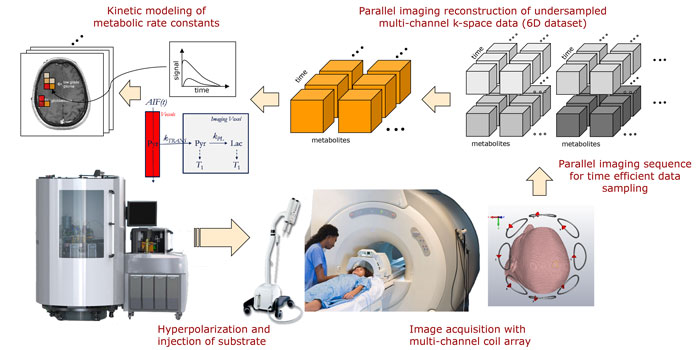Research focus
Hyperpolarized carbon-13 Magnetic Resonance Imaging (MRI) enables unique opportunities to measure various kinds of metabolism, e.g. in tumor tissue. However, the short-lived nature of the nuclear magnetization places high demands on the signal acquisition. In order to prevent signal loss, while acquiring large field-of-views (FOVs) with high spatial resolution, and in order to fully capture substrate uptake and metabolic conversion, fast data acquisition is crucial.
Parallel imaging is a powerful method that uses multi-channel coils to achieve reduced scan times. The method is based on using spatial information inherent to each coil element by means of sensitivity encoding in addition to traditional MR Fourier-imaging. However, for hyperpolarized carbon-13 MRI, traditional parallel imaging methods are challenged as it can be limiting or next to impossible to acquire the needed sensitivity encoding.
This project aims towards implementing parallel imaging sequences and reconstruction as a means to accelerate data collection for MRI scans utilizing hyperpolarized carbon-13 labeled substances. Hereby the project also aims towards better prospects for human clinical hyperpolarization studies, while at the same time assuring optimal benefit of currently and prospectively available multi-channel coils. This last aim connects the project closely to other projects in the center related to development of efficient coil arrays.

The project contributes to the HYPERMAG mission by seeking increased detection efficiency.
Experimental elements of the project are carried out in collaboration with the MR-Research Centre at Aarhus University Hospital and Rigshospitalet, Copenhagen University Hospital, Departement of Clinical Physiology, Nuclear Medicine & PET.
Scientific output
Find Rie's publications at DTU's online research database ORBIT.
Funding
The project is funded by Independent Research Fund Denmark, Technology and Production Sciences as part of the project Highly Efficient Cryogenic Resonators for Magnetic Resonance and Dynamic Nuclear Polarisation (DFF – 4005-00531B) and DTU Elektro. The project is part of the HYPERMAG Center of Excellence funded by Danish National Research Foundation (DNRF124).
Supervisors
Professor Jan Ardenkjær-Larsen and Associate Professor Lars G. Hanson.
Project Period
July 2019 - June 2020.
Caption, photo: Carbon-13 abdominal scan setup with multi-channel receive coil for sequence and coil testing using a custom-made phantom. The phantom contains natural abundance ethylene glycol and carbon-13-enriched substrates.
Caption, figure: Hyperpolarized Parallel MRI project overview; from substrate hyperpolarization to imaging biomarker. The main focus of this project is on the data acquisition and reconstruction.